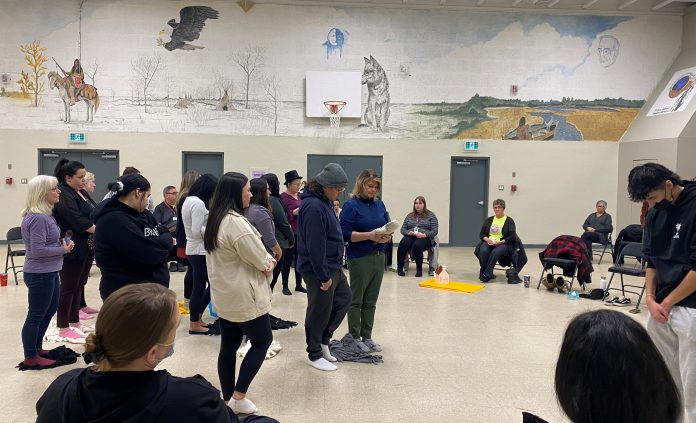
The Prince Albert Urban Indigenous Coalition had their first physical gathering in three years on Wednesday at the Prince Albert Indian & Metis Friendship Centre.
Members of the Coalition, Community Youth Building Futures, representatives from the Ministry of Social Services and Ronald McDonald House Charities gathered to partake in the Kairos Blanket Exercise to learn in-depth about the history of Indigenous peoples in Canada from first contact until today.
One of the goals of the Prince Albert Urban Indigenous Coalition is to work towards reconciliation and in order to do so, educating people about the true history of Canada is key, according to Friendship Centre Executive Director and Coalition Co-Host Janet Carriere.
“The blanket exercise is such an amazing teaching tool. It’s visual, it’s short, and we can go through the whole history of the Indigenous people in a way that people totally understand and get it,” Carriere said. “It’s a hard exercise, it’s very emotional.”
To start off, the floor is covered by blankets that are used to represent Turtle Island. As the exercise progresses, blankets are moved around the room and slowly taken away until they are few and far in between.
“We use the blankets are a symbolism of the land that’s taken away from the Indigenous peoples,” explained Carriere. “Using the blankets, getting smaller, having them gone, having you move to a different blanket, helps everyone understand the history in a visual way.”
The Urban Indigenous Coalition meets once a month, but due to COVID-19 pandemic restrictions and renovations done to the Friendship Centre, the blanket exercise hasn’t been held in almost four years.
“This was kind of a refresher, it was a good opportunity for us all to be refreshed,” Carriere said. “This is my fourth [exercise] and I pick up a little bit more each time I see it because it’s quite an emotional, overwhelming exercise. I find that each time I partake in it, I pick up a little bit more of the history.”
Carriere said these types of exercises are needed so that the community can begin to reach a place of equality, but unless everyone commits to walking together, we’re not going to get there.
“It’s very important for me growing up in a time where racism was really alive and rampant and seeing it somewhat settling down. I have two little great nieces who are pretty brown and it’s very important to me that their life be better, that they’re not treated differently because of the color of their skin,” Carriere said. “I know I won’t see it in my lifetime, but I’m hoping shortly after, people are judged on the person they are; not the color of their skin, not their sex, not their sexual persuasion, not their religion.”
The Urban Indigenous Coalition is made up of around 80 agencies and while Wednesday’s exercise did bring in a lot of participants, not all agencies allowed their staff to attend during the workday.
“We’re going to try working on that because we believe it’s very important for education [and] creating a difference in our community,” said Carriere, who added that they’re going to try asking more employers to get on board with these types of exercises.
Carriere said she’s always willing to help educate people at any opportunity and suggested that anyone who hasn’t had the chance to experience the blanket exercise to contact her.
“If anyone wants to learn more to be an ally, reach out to me,” she said. “I can help make that happen.”

